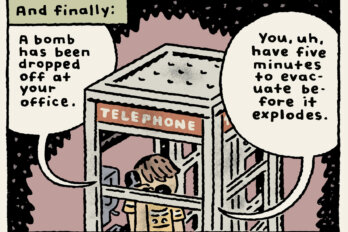As an undergraduate creative-writing student at York University in the nineties, I had a lot of time to read. I commuted three hours a day, navigating Toronto’s endless suburbs via a network of buses, and much of my time was spent waiting around between classes on a campus that was far from everything. I would often spend afternoons at the Graduate Lounge or the Underground, drinking pints and arguing with others about the writers who were put before us as examples of literature and craft.
Michael Ondaatje was one such author. He lived in the city and taught at York. For a creative-writing major in those years, Ondaatje was also shorthand for a poetic, tangential approach to writing. He was challenging, unabashedly literary, a local formalist who ravished some readers while repelling others. Reading Ondaatje was—and still is—an act of trust; you either fall backwards into his stylistic, symbolically charged narratives or you don’t.
His books, including In the Skin of a Lion and Coming through Slaughter, were not only studied as exemplary texts of Canadian literature but, because of their mix of fragments, poetry, history, and migration narratives, they were also regarded as unique postmodern experiments and one of the few regional examples of postcolonial fiction. Then with the release of his 1992 novel, The English Patient—a sweeping Second World War epic about an amnesiac soldier burned beyond recognition—Ondaatje became a worldwide cultural phenomenon. That story turned him into the first Canadian to win the Booker Prize, and the novel’s 1996 film adaptation won nine Oscars. It was even the subject of a Seinfeld episode.
Today, Canadian literature courses have changed—and so has the culture. Professors have begun teaching more contemporary offerings by Indigenous, female, LGBTQ, and multi-ethnic voices from around the world. More often than not, my students have not read Ondaatje, nor are they aware of the heights he once scaled. And, as other writers of his generation now spend half their waking hours on Twitter, eager to “engage” with readers, Ondaatje remains a private person. These days, he seems to emerge only once every six or seven years, on the occasion of a new book.
Ondaatje’s seventh novel, Warlight, which is set in the United Kingdom following the Second World War, is not a war novel so much as a novel that uses the aftermath of conflict as its theatrical backdrop. It is similar in tone and approach to his previous book, 2011’s The Cat’s Table—which told the story of a child named Michael who is sailing from Sri Lanka to England in 1954 to meet his long-estranged mother—even though it surfaces in a drastically angrier world. Indeed, as our culture has gravitated toward writing that tries to make sense of current identity struggles and global instability, Ondaatje’s novels, always reluctant to use such approaches, have receded ever further into historical set pieces, prizing artfulness and aesthetics over analysis. This is both the endearing and maddening aspect of reading Ondaatje: though the world around us is changing, his books are not.
Warlight opens in 1945, in a London transitioning from war back to peace, in an era when there was a clear demarcation between the two. It is a place and time where espionage and opportunists can operate in literal and figurative shadows. The novel’s protagonist is a fourteen-year-old boy named Nathaniel. His parents have just announced that they must leave for Singapore for a year, and though he and his sister, Rachel, don’t seem to miss their father’s presence, they feel abandoned by their mother.
The siblings aren’t quite alone, though. They live in their gloomy house with an acquaintance of their parents called The Moth, who had moved in as a boarder. The man may or may not be involved in criminal activities, and soon he brings a carousel of vaudevillian characters into their home, including an argumentative Russian, an ethnographer and geographer named Olive Lawrence, and a man known as The Darter.
Not long after their parents leave, Nathaniel and Rachel discover their mother’s packed trunk in the basement, and The Moth informs them that she hasn’t boarded a boat to Singapore after all. Where is his mother, Nathaniel wonders. More importantly, who is she, and why would she leave her children behind with a cast of mysterious strangers? All the people flitting in and out of the home seem to harbour secrets, ulterior motives, and other lives.
Warlight is a novel about spies, though it is not a spy novel. It wears the outer husk of an Alan Furst or John le Carré book but has no interest in the geopolitical plot embellishments of Cold War information gathering. In Ondaatje’s world of covert intelligence, multiple identities are an act of psychic deconstruction, not a portal for territorial intrigue. His version of spying is an inward gaze, a tragic awareness of life’s ever-changing frame that comes with growing up. Who is anyone, Ondaatje really wants to ask, once we factor in the personas we consciously present to the world, to family, and to ourselves?
As such, Warlight is presented as Nathaniel’s memoir of his sudden expulsion from childhood. But it is one written from the perspective of the protagonist as an old man, the novel’s tragic conceit; Nathaniel cannot grasp why his mother abandoned him or discover who she really was because his earliest memories are blurred at best, lending themselves to metafictional manipulation. “I am now at an age where I can talk about it,” he confesses early on, “of how we grew up protected by the arms of strangers.”
Meanwhile, the novel’s timeline is prone to hopscotch through the past, as one’s thoughts do before one falls asleep. “There are times these years later, as I write all this down,” Nathaniel states, “when I feel as if I do so by candlelight…to admit the altering movement of shadows.” The haziness of memory is an organizing principle, meant to cast light and shade on the past, imbuing some memories with alternative meanings while darkening others. In some places, that darkness collapses into a defeat: “I don’t know. I don’t know,” Nathaniel admits when trying to determine the nature of a relationship between The Darter and Olive Lawrence.
The novel’s title is a symptom of this darkness, “a time capsule of the war years when blackouts and curfews had been in effect.” Ondaatje appears mesmerized by this moment in history, when peace has dampened the chaos of war, no new natural order has settled, and a window of opportunity has opened for those who want change their lives. Nathaniel does just that when he grows up and joins the British intelligence service. With access to national-security files, he finally learns that spies were watching over his entire childhood and trying to protect him and his innocence. “You return to that earlier time armed with the present and no matter how dark that world was, you do not leave it unlit,” he writes. “You take your adult self with you. It is not a reliving, but a rewitnessing.”
Historical fiction, which is technically what Ondaatje has been writing for four decades, tends to serve a double function. It typically sheds light on its chosen era while casting an eye upon any parallels with the reader’s world. The most resonant of Ondaatje’s novels relate something of their author’s ideological underpinnings, either through details of his personal history or a deep understanding of immigration’s dualities. His maturation as a novelist took shape with the publication of his 1982 memoir, Running in the Family. A semi-fictionalized account of his own family’s history, the book was written after Ondaatje returned to Sri Lanka, the country he had left as a child. Through forceful poetics and magic realism, we encounter his alcoholic father, Mervyn; his absent mother, Doris; and his maternal grandmother, Lalla.
Ondaatje wrote in that memoir, “In Sri Lanka a well-told lie is worth a thousand facts,” and it’s a modus operandi he carried forward into 1987’s In the Skin of a Lion. He applied this idea—that reality is a truth underlying stories, not the facts that make up the surface—to his new home, drawing inspiration from the generations of immigrants whose sweat built Toronto in the 1920s and thirties. The skin of a lion, he infers, is something to be worn and shed, like the chosen identities of the immigrant.
One wonders if there’s any equivalent revelation underlying Warlight. Beyond its structural argument regarding the nature of memory, the book does little to elucidate its time period or to parallel an undercurrent of our times. Ondaatje’s time capsule is shut too firmly.
Ondaatje has noted before that each of his novels “is a re-writing of what you didn’t quite get to in the previous book,” and those who pick up Warlight will find that to be an accurate assessment. For long-time readers, the opportunity to interact with this novel comes in the detective work of watching how the author recasts his recurring interests and well-trodden details from his past. The sudden expulsion from childhood innocence, the boat journey halfway around the world, the effects of a mother’s absence, adolescence and its sponge of awareness, the aftermath of the Second World War—these are all pivotal elements in both his personal history and in his grand fictional experiments.
Ondaatje, now seventy-four, writes novels that are crystalline and complex constructions, but increasingly, they can also read like cocoons—thought experiments cast in a private language for one. His is a cast of puppets—another image that recurs, as if to deepen this self-awareness. The reader can admire their motions but not always empathize with their motivations. Some faithful readers may glimpse an evolution of ideas that have been at work in Ondaatje’s writing for decades, but what of younger generations? Is there anything there, apart from craft, for them to grasp in this deeply interior novel?
In her later years, Margaret Atwood has grown only more speculative, leveraging her experience to portend the larger questions that bedevil us. Leonard Cohen looked deep into the spiritual void in his final act. Alice Munro gave us stark examinations of human flaws right up to her retirement. These risks haven’t always succeeded, but at least they arose out of literature’s primordial desire to engage.
I can’t help but read Warlight and see an elder statesman actively disengaging with his times. There is something downright strange about seeing a writer of colour—a giant of Canadian multiculturalism, no less—deliver a story that seems to have a completely white cast and not have it be a comment of some sort. This century so far, with its focus on power imbalances and wars on terror, has been such a pivotal one for two generations of brown writers, such as Rawi Hage and Mohsin Hamid. These authors have done the hard work of arguing how they ought to be seen in the world. Have the misconceptions and stereotypes that have shaped so many of us affected Ondaatje at all? What could this master of narrative structure make of a world that has changed so swiftly? It would be a shame if we never got the opportunity to find out.
There’s no denying that Warlight aims to be timeless, but aspects of it also feel deeply out of step with the times. Readers can admire its gorgeous sentences, the poetics of its motion, and the ingenuity of its structure, but we cannot interact with its cordoned-off world; we can neither see ourselves in its characters nor learn from it. Warlight offers a beguiling escape into Ondaatje’s favourite subjects, but it’s a journey that we’ve made many times before.





